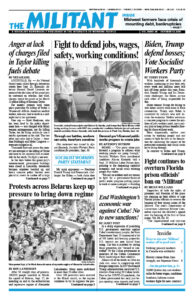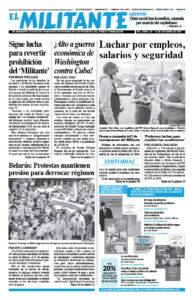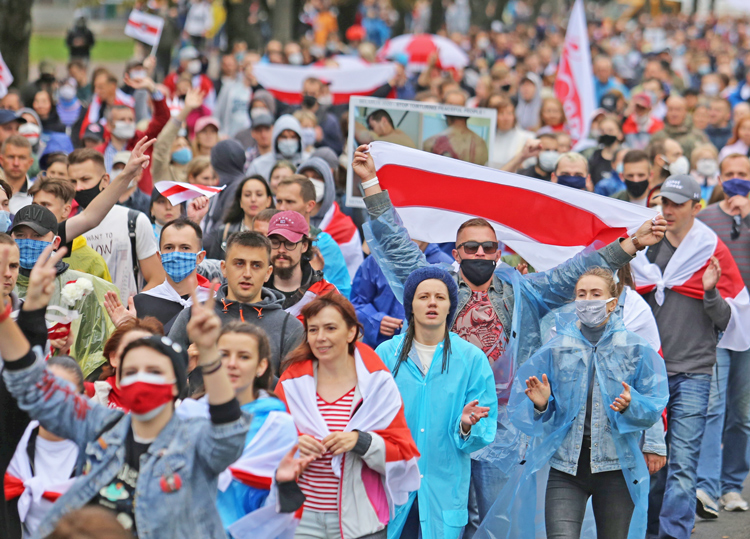After 50 straight days of protests, 100,000 people marched in Minsk, the capital of Belarus, Sept. 27, demanding an end to the authoritarian and repressive regime of Alexander Lukashenko. Many more mobilized in more than 20 other cities.
Over 200 protesters were arrested at the Minsk march, as the regime continues to try to suppress the protests since Lukashenko declared himself victor in Aug. 9 rigged presidential elections.
Days earlier, thousands demonstrated when news emerged of Lukashenko’s behind-closed-doors inauguration. Drivers slowed or stopped cars to cause traffic jams, impeding police from breaking up the protests. Riot cops eventually used water cannon and tear gas on demonstrators.
“The inauguration didn’t really change anything,” Hanna Varsotskaya told the Militant in a Sept. 26 email from Minsk, “yet it gave an incentive to continue” the protests. It was also “a reason for laughter,” lifting up the spirits of those fighting to rid the country of the regime, she said. At the Sept. 27 march crowds of people chanted “Impostor!” Some mocked Lukashenko’s 26-year rule by wearing cardboard crowns.
“For some time there has been a gradual increase in violence” inflicted on demonstrators, she noted.
Thousands of demonstrators have been detained this year. The government claims only five people have died at the hands of the cops. But more have “died after they returned home from detention centers, because of gangrene or serious internal injuries, or in the hospitals,” Hanna Sharko, a leader of Belarus Together in the New York region, told the Militant Sept. 28. “The exact number now is still hidden.”
Some of those joining the Sept. 27 action in Minsk chanted “Sviata is our president,” demonstrating their support for Sviatlana Tsikhanouskaya, the opposition candidate who is widely recognized as having won the election. Lukashenko jailed most opposition candidates to prevent them from running against him.
His rule has become a political and social disaster for working people. Tsikhanouskaya, who ran after Lukashenko jailed her husband, calls for fresh elections and ran on a program of capitalist reforms. In the course of deepening struggles working people will have openings to forge their own leadership.
In an interview posted on YouTube Sept. 25, miners’ leader Yuri Korzun, from the giant potash mining and processing complex of Belaruskali, said strike actions around the country at the end of August pushed the regime back and “stopped the violence, torture and killings” for a time.
But “shortly afterwards threats from the factories’ directors started,” he said. Bosses threatened they would make workers “financially responsible” for all the losses claimed by enterprises as a result of the strike action. When a majority of the workers went back to work, many organized to slow down production by working to rule.
Imperialist powers, Moscow rivalry
On Sept. 29 French President Emmanuel Macron met Tsikhanouskaya in Lithuania, where she is currently in exile. Macron, who is seeking to bolster French imperialism’s position in Europe, said he would press for the release of political prisoners in Belarus.
Tsikhanouskaya has called for sanctioning Lukashenko’s business connections. She opposes sanctions aimed at the country as a whole, saying “ordinary people will suffer most.” She has also emphasized that the protests are “not against Russia.”
Russia is both the main market for products made in Belarus and Belarus’ main source for obtaining raw materials and oil. Russian President Vladimir Putin has denounced European Union “meddling” in what he sees as the Russian rulers’ sphere of influence.
For years Lukashenko ruled by playing off European imperialist powers and Moscow against each other. Now the deep political crisis has forced him to rely more heavily on Moscow to help prop up his widely detested regime.
Around 1,000 Russian paratroopers began exercises with Belarusian troops in Brest, near the Polish border, and in Grodno, near the Lithuanian border, soon after Lukashenko met with Putin in Sochi, Russia, Sept. 14.
Moscow sees Belarus as a buffer against the expansion of the Washington-led NATO military alliance in Eastern Europe. U.S. troops and tanks are in neighboring Lithuania and Estonia as part of long-term NATO exercises. The Pentagon also heads a NATO force stationed in Poland.
Miners’ leader Korzun in his YouTube video said he wanted “our country to remain independent, and not be annexed by Russia or any other country.”


